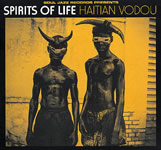|
|
 |
Dusted Reviews
Artist: V/A Album: Spirits of Life - Hatian Vodou Label: Soul Jazz Review date: May. 11, 2005 |

|
|
|
 |
Spirits of Life, among other things, solidifies the status of Soul Jazz as the foremost purveyor of the coffee table CD. A nice thick booklet, a good load of photographs, and a few passages about Haiti and the Diaspora, form something that feels like the catalogue of a museum exhibition. In fact, the oxydized sheen of the presentation itself runs the risk of contradicting the thesis upon which this music, like the religious music of nearby Cuba and trance music the world over, is made, for it should be the very definition of a living art. Recorded with a clean but live feel, and packaged like some ethnographic trophy, Spirits of Life may never fully reveal itself to the uninitiated – there are codes present that most of us aren't going to pick up, let alone understand – but repeated listenings yield the basic elements that define Haitian rada music, with one foot in the Congo and the other firmly planted in Benin (the world capital of Vodun.) The Soul Jazz volume, attributed to the ensemble Spirits of Life, brings to the forefront of the mix a melodic complexity that never made it to the surface of the Smithsonian recordings dating back to 1950.
Spirits of Life, led by Houngan (part priest, part master of ceremonies) Gerard Gaie Andiernicon, seems to give equal room in the mix to all 12 of the musicians involved – the majority of which are women singers – rounded out by the four-man drum corps Societe Absolument Guinin. Not unlike the woodpecker ostinato created by the mutant likembes of Konono No. 1, the melodies of the four drummers fuse so seamlessly that they often sound like a single instrument, such as a xylophone or marimbula. The tempo sometimes reaches that of a speedy rumba, with a frenetic, mathy foundation of bass. The singers follow the Houngan as he courts the presence of the major Lwa, or spirits (clearly the vodou equivalent of the orisha, or deities, in Afro-Cuban santeria) and calls them by name…Legba, Dambala, Baron Samedi.
The call and response between Houngan and chorus, sometimes lilting along in a very French, nasal drawl that wouldn't sound out of place in Cajun music, guides the proceedings. The drummers jump in so quickly and precisely they almost become unnoticeable: this is tight, instinctive ensemble playing, emblematic of the precision and flow necessary to pull the hands of the dead through the ground and clasp the ankles of adherents who dance above them.
An occasional shriek or scream rips free from the chorus, reminding the listener that this music isn't about the rapid, liquid groove of the rhythm itself. To the contrary, these outbursts brace the listener like a spray of rum in the face, an exclamation from the mouth of a Mambo, grabbing the spectator by the jaws to stare into the eyes of the possessed. All clearly part of a greater musical system, the rhythms and songs that make up the bulk of the collection sometimes melt into one another, and it's unfortunate that the liner notes concentrate on the generalities of the diaspora as opposed to why no less than six songs share the title “Erzulie-Ti Jean (Petro)” and four are listed as “Agoué-Dambala (Yanvalou Zépol.)” Still, it's a handsomely packaged piece of work, set apart from its predecessors by strong production values not typically associated with the poverty and grit that stands between these living spirits and Western worldbeat junkies.
By Andy Freivogel
|







